- Home
- Gordon Korman
Linked Page 2
Linked Read online
Page 2
I blurt, “Is that blood?”
Andrew Yee, an eighth grader whose mother works with Dad at the dinosaur dig, takes my arm and starts leading me out of the atrium. “Come on, Dana. Nothing to see here.”
I shake him off. “Are they putting up a mural?”
“Nah,” he replies. “They’re just cleaning.”
At that moment, the duct tape separates from the plaster, and the tarp peels away and drops to the floor. I stare at the wall that’s now revealed.
I gawk. I goggle.
The lines have been blurred by the custodians’ mops, but it’s very clear what someone has painted up there. As I gaze in shock at the swastika in the atrium, it occurs to me that I’ve never seen one firsthand before. Oh, sure, in World War II movies and in books about the Nazis and the Holocaust. But not in my school, in a spot where six hundred kids walk under it every day. It’s uglier up there than it looks on a page or a screen because it’s not a picture or a prop. It’s not there to help tell a story or to educate. It’s the real thing, painted in anger and hatred.
Hundreds of phones appear, and the air fills with the whirring and snapping of pictures. I’m rooted to the spot. Now I understand what all the watching and whispering was about. A swastika is a symbol of hate in general, but it’s especially a symbol of anti-Semitism. And everybody knows that I’m the only Jewish kid at Chokecherry Middle School.
I’ve never seen Mr. Brademas move quite so fast as he does getting over to the fallen tarp and handing it up to the custodians on the stairs. While they try to stick it back on the wall, the principal orders us to our homerooms.
Nobody moves. What we’ve just seen is awful, but for some reason we can’t turn our backs on it.
“Put those phones away!” Mr. Brademas orders, sounding a lot like a Marine drill sergeant barking commands at new recruits. “Clear the atrium!”
At that point, the bell rings, and we all begin to shuffle off to lockers and homerooms. Behind us, the tarp hits the floor again, and I catch one more glimpse of it as I round the corner.
“You okay?” Andrew asks anxiously.
“Why wouldn’t I be?” I snap.
And I am okay, I tell myself. Why should I get upset just because some wing nut put a swastika on the wall? I’ve been alive for thirteen years. It’s not like this is the only bad thing I’ve ever seen. And this isn’t Nazi Germany just because somebody painted a Nazi symbol.
I scan the faces in the hall. Most kids are talking a mile a minute about what we’ve just witnessed. One thing about a small town like Chokecherry: Nothing ever happens. So when it does, it’s big news. A few people look kind of solemn and tight-lipped, but most have their phones out and are comparing swastika pictures. A few have even taken selfies with the awful thing in the background. Probably by the end of homeroom, Instagram will be flooded with the postings—Me with swastika. Cute.
Not cute.
Actually, deeply disturbing.
Okay, maybe I’m a little more rattled than I’m willing to admit. Because that swastika means there could be someone in this school who hates me. Not dislikes me, or finds me annoying. A swastika sends you directly to the h-word, do not pass Go, do not collect $200.
I’ve gotten strange looks in the past. A handful of insensitive, mean comments. But not hate. Nothing like that.
The swastika is bad enough, but the thought of some shadowy person actually drawing one is worse. Why would anybody do that? It’s probably just a sick joke, but what if there’s more to it than that?
If this question sends a chill up my spine, it seems to thrill a lot of my classmates. I can’t believe that so many of them think this is a fun thing to spice up a boring school week—like the time the bus broke down and they had to call the giant tow truck. Excited speculation buzzes through the halls. Who did it? And why? Is there a racist in our school? A neo-Nazi? Is it serious, or just somebody trying to pull our chains? Is a student behind it, or did some adult sneak into our school with a can of red spray paint?
“I heard it was Michael Amorosa,” Pamela Bynes is saying not far away from me. “Mr. Kennedy caught him in the act.”
“That’s crazy,” Jordie Duros scoffs. “Why would Michael paint a swastika?”
“He didn’t,” Goren Lund replies. “He’s just the guy who found it. He got so freaked out he dropped his phone and it broke.”
“Maybe it was Mr. Kennedy,” Pamela suggests. “He’s always in the school.”
“Mr. Kennedy’s worked here forever,” Jordie points out. “If he was a Nazi, we’d know by now.”
Notice how I rattle off all their names. I doubt that many people in this school know Andrew and me. We’re the scientists’ kids. I’ve heard us called egglets—children of the eggheads. It’s not an insult—or at least I don’t think the locals mean it to be. It’s just the way things are around here. It’s a reminder that race and religion aren’t the only things that can make you an outsider.
Andrew stays with me all the way to my homeroom, like I’m made of delicate crystal or something. I always thought he wasn’t as sensitive as I am to our outsider status, but I might be wrong about that. Or maybe I look worse than I realize.
“Don’t freak out,” he tells me at the doorway to the class. “It’s going to blow over. I promise.”
“Thanks.”
But when I walk into Mr. Slobodkin’s homeroom, every single eye is laser-focused on me. I wonder how Andrew can make a promise like that.
If the kids are all staring at me, Mr. Slobodkin is doing the exact opposite. His effort to look anywhere else but in my direction is giving him a crick in the neck. How am I going to survive this homeroom without losing my mind?
The answer to that comes via the PA. “All classes are to meet in the auditorium in ten minutes for an important assembly.”
I have a sneaking suspicion that this doesn’t mean a surprise performance by a traveling troop of jugglers.
I always wondered what a sinking heart feels like. Now I know.
Our auditorium seats five hundred forty. Since there are over six hundred students in the school, the overflow has to sit on folding chairs in the orchestra pit. I’m praying for the last row of the balcony. No such luck. Mr. Slobodkin is the oldest, slowest teacher in the whole school. By the time we get down there, the only open spots are right in front of the stage. I couldn’t be more on display … or at least that’s how it feels.
In the six months since we moved to Chokecherry, I’ve seen Principal Brademas furious, elated, stern, excited, and even emotional. But this is a new one. He looks like he’s just been dragged backward through a hedge. His face is bright red, his hair is standing on end, and his expression is more stunned than anything else. He surveys the crowd and—maybe it’s just me, but—his eyes linger on the Jewish girl in the front row.
“Many of you know that our school was the target of an act of hateful vandalism last night. A white supremacist symbol was painted on the wall of our atrium. Let me stress that we know very little about this incident right now. We don’t know who did it, and we don’t know what that individual’s motive might have been. But I felt it was important for us to get together as a school community and clear the air before the rumors get out of hand.”
You’d think we’re in an empty room. That’s how silent it is.
“People might tell you,” the principal goes on, “that the swastika on our wall is an ancient symbol, a kind of cross, that has had many meanings over the centuries. Don’t believe it. Today the swastika has only one meaning: pure hatred. Most notoriously, it is the symbol of Nazi Germany, an evil regime that killed millions. It screams not just anti-Semitism, but every other kind of racism and intolerance. It is an attack against not just our minority students, but against every single one of us. And it’s a hundred percent unacceptable.”
A smattering of applause greets this. I don’t join in. It’s like my hands are made of lead.
Seated next to me, Eli Vardi offers up a high
five that I just stare at.
“What’s that for?” I ask him.
“Isn’t this great news for you?” he demands.
“How do you figure that?”
“Brademas is anti-swastika,” he explains. “And you’re …”
I play clueless. “From Massachusetts?”
“Our custodians are in the process of removing that repulsive symbol from our atrium,” Mr. Brademas goes on. “We won’t have to look at it anymore, but that doesn’t mean it will be gone. A swastika may be a painted picture, but it’s also an idea that survives, spreading its poison long after the symbol has been erased. But there’s an antidote to the poison, and that antidote is information. I’ll be speaking with the school board, the teachers, and the parents. We will combat this with a tolerance education project that will involve every student and classroom. Where there’s darkness, we will shine a light.”
The principal kind of slumps for a moment, almost like it took everything he had to make it this far. Then he says, “I’m sorry that we have to go through this. But I hope we’ll be stronger as a community when we come out the other side.” And he walks off the stage, shoulders sagged.
This time the teachers applaud and maybe a few kids. Even me—I find my hands at last. But for the most part, the six hundred plus are pretty cowed. Not many of the students of Chokecherry Middle School are big Brademas fans. But when you see your principal so obviously shaken, it makes you think that maybe you should be more upset than you really are.
The next time I pass through the atrium, on the way to lunch, the wall has been repainted. You’ve never seen so many kids staring at a blank wall.
The swastika is gone, but it isn’t.
Today’s lesson is this: A swastika in your school trumps dinosaur poop in your mail slot.
Dad makes me clean up the fertilizer in the paleontology office. But here’s the thing—the scientists are pretty cool about it. That kind of annoys Dad. He wanted them to threaten to call the FBI or something. This one guy, Dr. Levinson—he says his daughter goes to our school—actually admits the chicken bone is pretty funny.
The main reason I get a free pass on the dino poop is because the whole town is losing their minds over the swastika in the school. It isn’t even in the school anymore. It took the custodians less than one assembly to wash it off and paint it over. That’s part two of the lesson: Dinosaur poop is temporary; a swastika is forever.
I’m blown away. Now we’re going to have a school-wide tolerance education unit because of a piece of graffiti that was on the wall for about five seconds. By the time the unit is halfway through, I’ll bet no one will even remember why we started it in the first place.
Jordie, Pouncey, Sophie, and Pamela are being extra nice to me for not ratting them out over the dino poop. Except Pouncey—being nice isn’t really his thing. But the others buy my lunch the next day, which is great, since it’s pizza day and our cafeteria brings in from Angelino’s.
“Thanks, guys,” I say as we take our seats in social studies. “Some of you,” I add, with a look in Pouncey’s direction.
He shrugs it off. “Couldn’t have killed you to shovel it up. We didn’t get much fertilizer through the slot before that car came.”
“Because Pam brought the wrong funnel,” Jordie puts in with a grin.
Pamela kicks him under the desk.
When Mrs. Babbitt breezes into the class, the first thing she does is tape up a big sign that reads NO PLACE FOR HATE.
“Okay, everybody, let’s get right to it. You all heard the principal, so you know what this is about. Our unit on tolerance education starts today.”
“Figures,” Jordie whispers. “When the elementary school wanted new playground equipment, it took three years to get it. But bring up something boring, and it’s ready to go in twenty-four hours.”
“I hate this,” Pouncey groans.
“You can’t do that here,” I remind him in a low voice. “Read the sign.”
Mrs. Babbitt begins by talking about World War II, the Nazi Third Reich, and the Holocaust. None of this is news to us. We all did a Holocaust unit in fifth grade at Chokecherry Elementary. But no matter how many times you study it, the numbers still grab you. In their concentration camps, the Nazis murdered eleven million people, including over six million Jews.
“Six million,” the teacher repeats. “Living in a small town like ours, it’s hard to imagine that many people. Even Denver’s population is only a fraction of that.”
We also watch a video about a middle school in a town called Whitwell, Tennessee, population 1,600. To help them make sense of a number like six million, they set out to collect six million paper clips. It seemed impossible at first, because the number was so huge and their town was so small. But word of the project spread. Paper clip donations began to pour in from all around the globe. In the end, those kids collected five times as many paper clips as they needed, and founded a world-renowned Holocaust museum.
“No wonder you can never find a paper clip when you need one,” Jordie comments when the bell rings and we’re heading for the door. “They’re all in Tennessee.”
“Never mind that,” Sophie says with enthusiasm. “Those kids are celebrities! People wrote books about the paper clips project. They made a movie.”
This girl Dana—one of the egglets—regards Sophie in amazement. “That’s all you got out of this? That a bunch of kids ended up famous?”
None of us know the Wexford-Smythe kids that well, but Dana stands out in at least one way. She’s Jewish—in fact, she’s the only Jewish student in our school. It makes sense that she’d be extra touchy about the whole swastika thing.
“Of course not,” Sophie says, embarrassed. “I just think it’s cool that …” Her voice trails off. “I guess none of it’s very cool.”
Dana nods her agreement and steps out into the hall … but not before she shoots me a stink eye.
Pouncey sees it. “Dude, that girl hates you. Guess the magic is over.”
“Or it’s not effective on egglets,” Jordie puts in.
I sigh. “Shut up, you guys.” I understand what they’re saying, though. I’m actually kind of happening at our school. A lot of that comes from being good at sports, but it hasn’t really hurt me that I’m sidelined this semester. The dirty look I got from Dana—that doesn’t happen very often.
That’s when I remember Dr. Levinson, whose daughter goes to school here. He called her Dana. “It’s the dinosaur poop,” I conclude. “Her dad must have told her about it.”
“She’s going to flunk tolerance education,” Jordie predicts. “She’s already having trouble tolerating you.”
We all laugh. Even Pouncey cracks a half smile.
Come to think of it, Pouncey is probably going to get an A-plus at this unit. Just living with his family, he has to do more tolerating than the rest of us put together.
Dad isn’t a fan of the new tolerance education unit—but not for the same reason as the kids at school.
“No place for hate,” he complains at dinner that night. “Like we have to remind ourselves not to be terrible people! The optics couldn’t be worse. And all for one little blip on our radar screen—some dumb kid who drew a swastika. Probably didn’t even know what it meant.”
“That’s why you need tolerance education,” my mother insists. “So the next dumb kid knows what it means and doesn’t do it.”
Dad gestures impatiently with his fork. “You’re both missing the point. You don’t call attention to one little hiccup. You wait for it to blow over. Turning it into a big deal makes the whole town look bad!”
It’s like he sees his dreams of Dino-land slipping away from him. I can relate. I had dreams too—of playing soccer this fall. Remember that? Yeah, Dad, stuff happens.
Normally when Dad goes off on a rant, Mom just lets him talk. But for some reason, this swastika thing has got her on edge. I’ll never forget the look on her face the night we drove to the school and saw the
wall of the atrium. She didn’t say a word, but she couldn’t take her eyes off it, almost like she was hypnotized.
“If you ask me, showing that we take this seriously makes the town look good,” she retorts.
Dad shakes his head. “You don’t understand. The dinosaur dig is a once-in-a-lifetime opportunity. There’s no limit to how much prosperity it could bring in. Kids love dinosaurs, and kids bring parents with their tourist dollars. Chokecherry could be to dinosaurs what Nashville is to country music; what New York is to theater; what LA is to movies—”
I finish his old song. “The next Orlando.”
“Exactly! But when investors look for a place to put their money, they don’t want to hear words like racism and swastika. They want a quiet, picture-book town in a gorgeous mountain setting, where nothing bad ever happens.”
Mom raises both eyebrows halfway to her hairline. “Really, George? Ever?”
My father turns red as a tomato. “That was a long time ago,” he mumbles. “It probably never even happened.”
This is starting to get interesting. “Wait, what? What probably never happened a long time ago?”
Dad glares at my mother. “You see? This is how it starts. A few baseless rumors get around, and pretty soon you can kiss Dino-land goodbye!”
Mom looks at me. “I don’t want to upset you, Link, but forty years ago, things were different around here—”
“Nicole!” Dad interrupts. “Don’t tell him a crazy story like that. He’ll tell his friends, and pretty soon it’ll be the talk of the town!”
I’m totally hooked now. “What happened forty years ago?”
“The Ku Klux Klan,” she explains. “They were here in Shadbush County.”
My father regards me pleadingly. “Listen, Link. It was almost half a century ago. The world was a different place. Your mother and I weren’t even born. A lot of areas had groups like that. Is it something to be proud of? Of course not. But it also isn’t a reason to sacrifice everything. The Wexford-Smythe dig is an opportunity for us, but the window won’t stay open forever. If we scare away our whole future dithering over a little bit of paint on a wall or some ancient history, we’ll deserve what we get. Which will be nothing.”

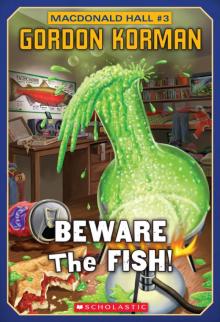 Beware the Fisj
Beware the Fisj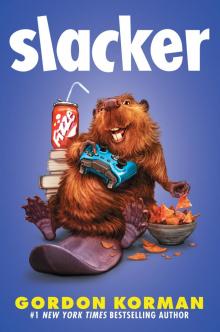 Slacker
Slacker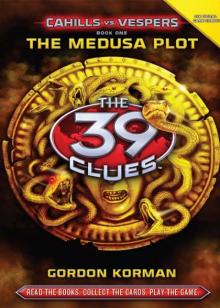 The Medusa Plot
The Medusa Plot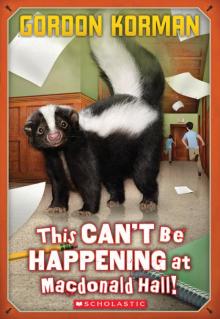 This Can't Be Happening at MacDonald Hall!
This Can't Be Happening at MacDonald Hall!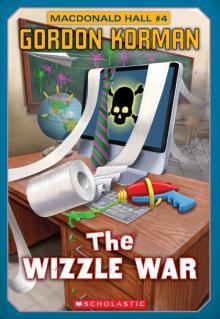 The War With Mr. Wizzle
The War With Mr. Wizzle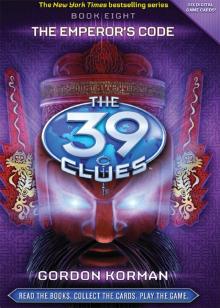 The Emperor's Code
The Emperor's Code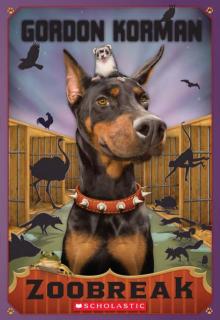 Zoobreak
Zoobreak The Danger
The Danger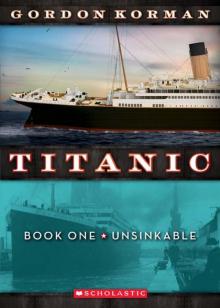 Unsinkable
Unsinkable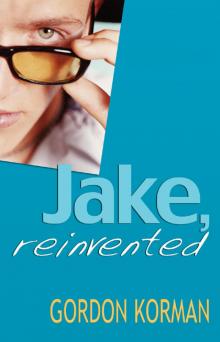 Jake, Reinvented
Jake, Reinvented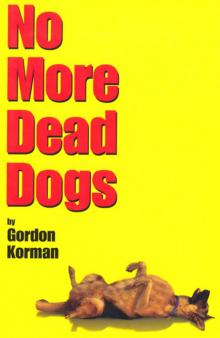 No More Dead Dogs
No More Dead Dogs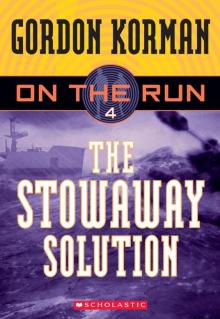 The Stowaway Solution
The Stowaway Solution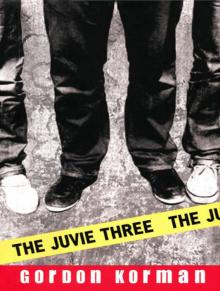 The Juvie Three
The Juvie Three The Climb
The Climb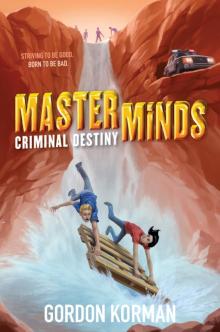 Criminal Destiny
Criminal Destiny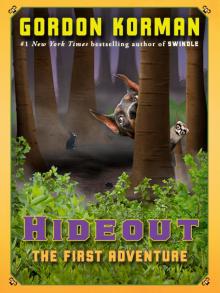 Hideout: The First Adventure
Hideout: The First Adventure Flashpoint
Flashpoint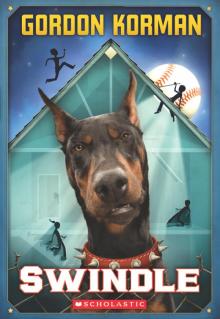 Swindle
Swindle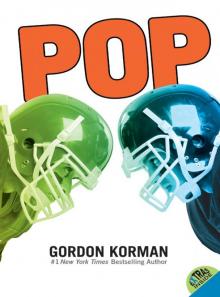 Pop
Pop The Rescue
The Rescue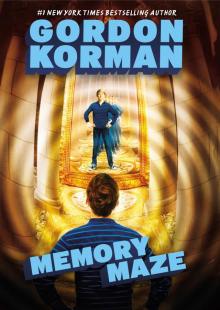 Memory Maze
Memory Maze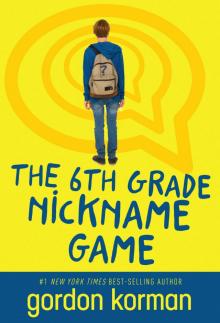 The Sixth Grade Nickname Game
The Sixth Grade Nickname Game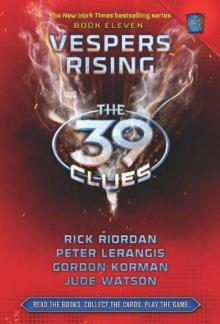 Vespers Rising
Vespers Rising Collision Course
Collision Course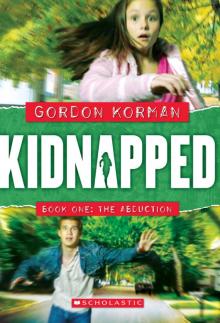 The Abduction
The Abduction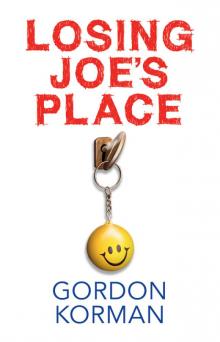 Losing Joe's Place
Losing Joe's Place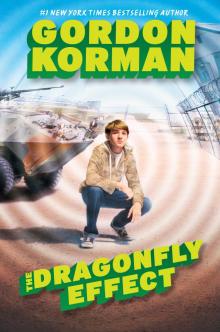 The Dragonfly Effect
The Dragonfly Effect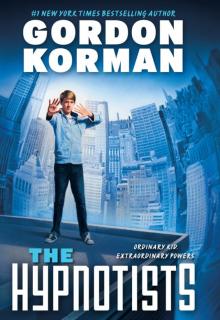 The Hypnotists
The Hypnotists Survival
Survival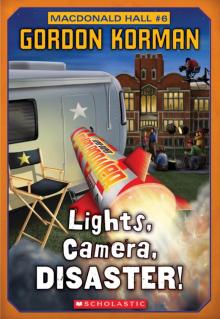 Lights, Camera, DISASTER!
Lights, Camera, DISASTER! Payback
Payback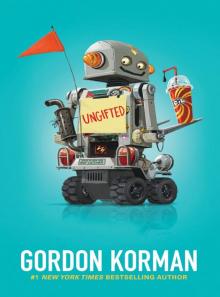 Ungifted
Ungifted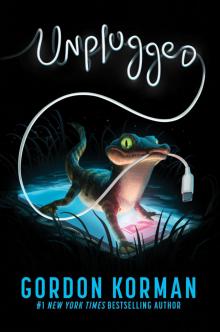 Unplugged
Unplugged Framed
Framed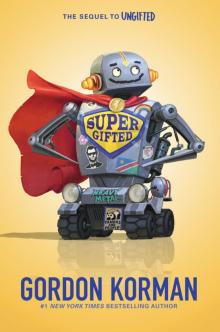 Supergifted
Supergifted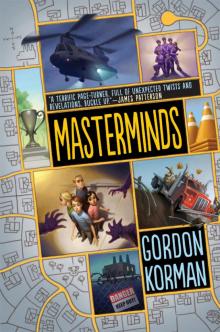 Masterminds
Masterminds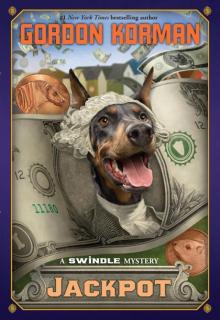 Jackpot
Jackpot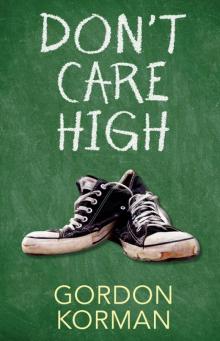 Don't Care High
Don't Care High The Deep
The Deep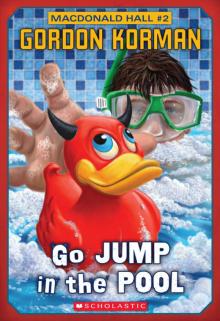 Go Jump in the Pool!
Go Jump in the Pool! The Contest
The Contest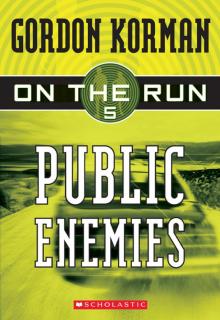 Public Enemies
Public Enemies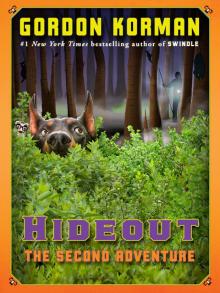 Hideout: The Second Adventure
Hideout: The Second Adventure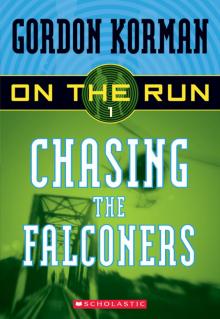 Chasing the Falconers
Chasing the Falconers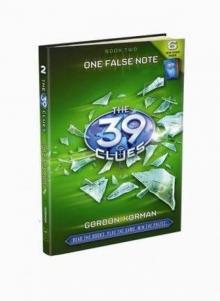 One False Note
One False Note Shipwreck
Shipwreck Jingle
Jingle Unleashed
Unleashed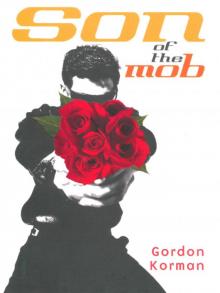 Son of the Mob
Son of the Mob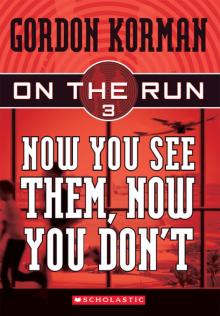 Now You See Them, Now You Don't
Now You See Them, Now You Don't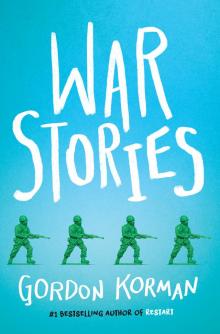 War Stories
War Stories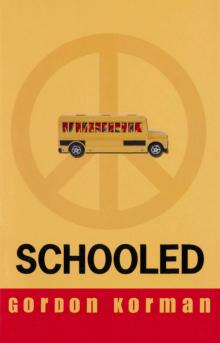 Schooled
Schooled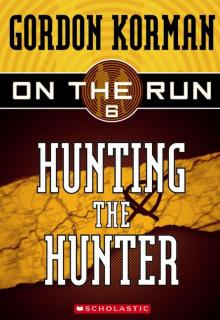 Hunting the Hunter
Hunting the Hunter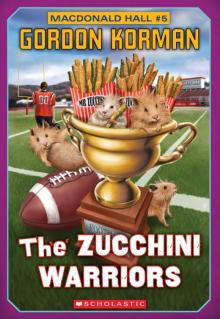 The Zucchini Warriors
The Zucchini Warriors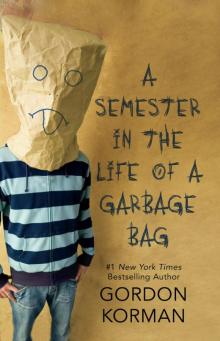 A Semester in the Life of a Garbage Bag
A Semester in the Life of a Garbage Bag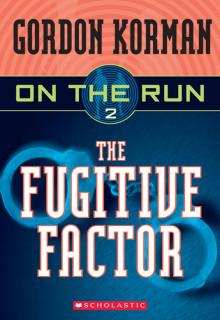 The Fugitive Factor
The Fugitive Factor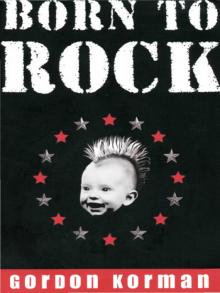 Born to Rock
Born to Rock The Summit
The Summit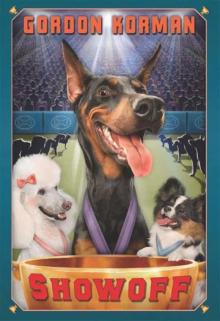 Showoff
Showoff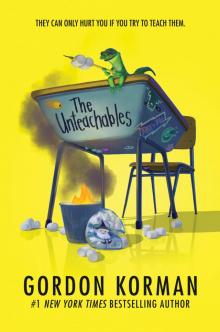 The Unteachables
The Unteachables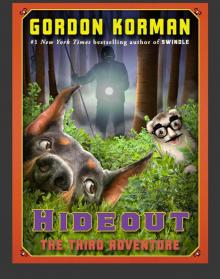 The Third Adventure
The Third Adventure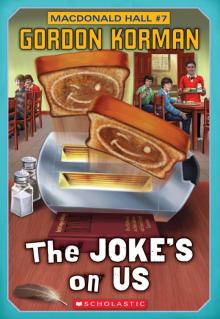 The Joke's on Us
The Joke's on Us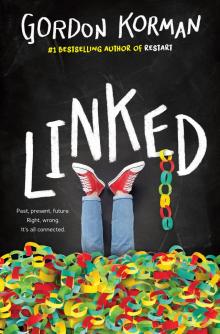 Linked
Linked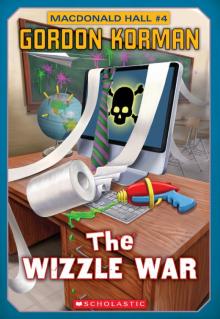 The Wizzle War
The Wizzle War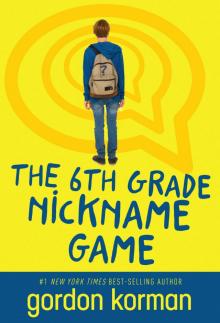 The 6th Grade Nickname Game
The 6th Grade Nickname Game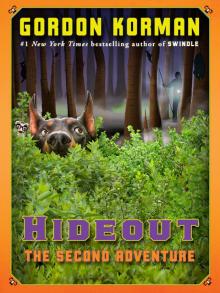 The Second Adventure
The Second Adventure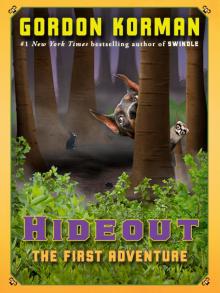 The First Adventure
The First Adventure![39 Clues : Cahills vs. Vespers [01] The Medusa Plot Read online](http://i1.bookreadfree.com/i2/04/10/39_clues_cahills_vs_vespers_01_the_medusa_plot_preview.jpg) 39 Clues : Cahills vs. Vespers [01] The Medusa Plot
39 Clues : Cahills vs. Vespers [01] The Medusa Plot